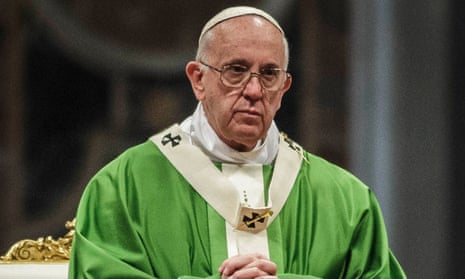The Catholic church has called on UN negotiators convening in Paris at the end of November to agree a goal for “complete decarbonisation” by 2050, and set a legally binding agreement to limit global temperature increase.
The statement, which was announced by the Vatican on Monday and signed by Catholic officials from five continents, represents a sweeping attempt to link climate change to social justice and the exclusion of poor people who stand to lose the most from global warming.
The 10-point plan was delivered about five months after Pope Francis released his encyclical on the environment, which firmly established that the fight against global warming is a key imperative for the Vatican under the leadership of the Argentinian pope. Climate change was a significant focus of the pope’s recent trip to the US, where he spoke about the issue in front of the UN general assembly and the US Congress.
While in America, the pope said the environment itself – not just humanity – was deserving of rights. He has stated unequivocally that climate change is a result of human activity and the result of excessive reliance on fossil fuels.

But despite his rhetoric the church has not endorsed any campaign to divest from fossil fuel investments. Previously, the Vatican has suggested that it would examine the idea.
“We join the Holy Father in pleading for a major breakthrough in Paris, for a comprehensive and transformational agreement supported by all, based on principles of solidarity, justice and participation,” the statement said.
“This agreement must put the common good ahead of national interests. It is essential, too, that the negotiations result in an enforceable agreement that protects our common home and all its inhabitants,” the appeal said.
The 10-point plan urged negotiators to mind not only technical but also “ethical and moral dimensions of climate change”. It called on leaders to adopt a “fair, transformational and legally binding global agreement … that recognises the need to live in harmony with nature, and to guarantee the fulfilment of human rights for all”.
The church is demanding that the Paris agreement limit the global temperature increase and that it serve to protect, in particular, communities suffering the effects of climate change, such as the Pacific Islands and coastal regions.
In a nod to Francis’s frequent assessment that rich countries have a debt to pay to poorer ones, the statement called for “ambitious mitigation commitments” to be agreed and said each country ought to recognise “common but differentiated responsibilities” based on equity principles and historical responsibilities.
“Those responsible for climate change have responsibilities to assist the most vulnerable in adapting and managing loss and damage, and to share the necessary technology and knowhow,” it said.
Without mentioning specific proposals, it also called for “new models of development and lifestyle” that would bring an end to the era of fossil fuels, including emissions generated by the military, aviation and shipping. It also voiced support for alternative energy sources.

Comments (…)
Sign in or create your Guardian account to join the discussion